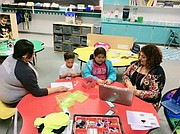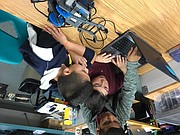Saddle Mountain 3rd-5th graders to compete in VEX IQ Robotics
MATTAWA — Saddle Mountain Elementary third- through fifth-grade students will compete in their first-ever VEX IQ Robotics Challenge and First Lego League competitions this weekend.
Advisor Cesar Ortiz, a STEM (science, technology, engineering, mathematics) Specialist, Vex IQ coach, and Principal Intern, is excited that robotics, which is big at the high school and junior high, has reached down to the lower grades.
“The engineering knowledge and programing skills of our students at Saddle Mountain Elementary will be put to the test,” he said.
SME’s first Vex IQ Robotics competition will be held Dec. 10 at Central Washington University from 8 a.m.-3 p.m. This competition consists of three challenges.
“Students have been working hard putting in hours of designing, building, driving, programming and testing their robots to best complete these challenges,” Ortiz said.
In the Robot Skills Challenge, one robot takes the field to score as many points as possible. The Teamwork Challenge is an alliance of two robots under driver control working together in each match to score as many points possible. The Programming Skills Challenge involves one robot scoring as many points as possible autonomously.
This Saddle Mountain Elementary VEX IQ Robotics Club includes 18 students. They meet every Tuesday, Wednesday and Thursday from 2:30-3:30.
“The robotics club supports the S.T.E.M. (Science, Technology, Engineering, and Math) initiative as well as Math and Science in the classroom,” Ortiz said.
The first Saddle Elementary Club Lego League (FLL) Club includes six Students. They meet every Tuesday, Wednesday and Thursday after school.
The FLL club will be attending its first tournament on Sunday, Dec. 11, in Spokane at Salk Middle School.
Each year, the First Lego league releases a challenge which is based on a real-world topic. This year’s topic is Animal Allies.
“Think of people and animals as allies in the quest to make life better for everyone. Sometimes people help animals, and sometimes animals help people,” Ortiz said.
Each challenge has three parts: the Robot Game, the Project, and Core Values. Teams of up to 10 students participate in the challenge by programming an autonomous robot to score points on a themed playing field (Robot game), developing a solution to a problem they have identified (Project), guided by First Lego League Core Values.
Students will need to identify a situation in which people and animals interact and identify a specific problem, Ortiz said. They then have to design a solution to that adds value to society and share their solution with people who own or care for animals or a professional who might be interested in their idea.
“Students have been researching the importance of cows, from the milk they provide to the importance of manure,” Ortiz said.
The FLL Club has opened the doors of inquiry and knowledge into the surroundings of the students’ community.
“The skill set developed will guide our students into various areas of STEM and open doors once thought unimaginable,” Ortiz said.





